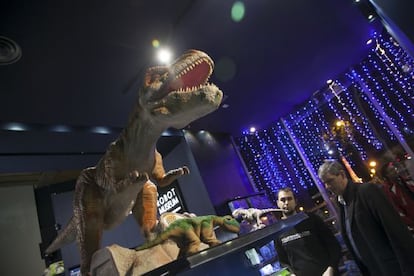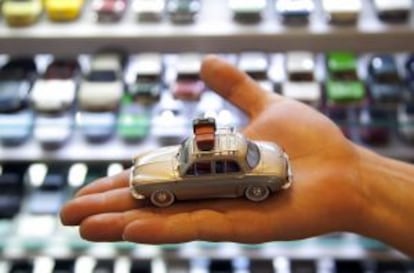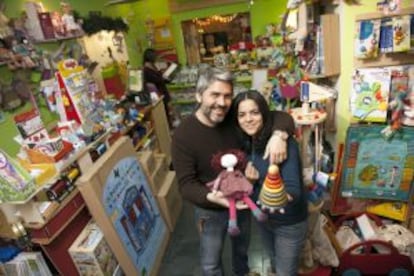The Christmas toys not seen on TV
Some Madrid stores are striving to offer unique playthings not advertised on the box

“I want it, I want it, I want it!” There’s not a child out there who isn’t drawn to the TV screen at this time of the year, when toy commercials are featured left, right and center.
And it’s no wonder that manufacturers spend so much money on air time. Nine out of every 10 requests in letters to Santa – or for many Spanish kids, to the Three Kings – are for toys advertised on TV.
Yet a few toy stores in Madrid sell objects that fall outside these campaigns of saturation – items such as handmade dolls, scale-model cars, boardgames from other cultures, robots and wooden puzzles.
Some stores serve such a specific target group that they say the crisis has not affected them
Consumer habits are changing, and some are turning their backs on the megastores in favor of small local establishments – a trend that a number of unique toy shops are hoping to join with their offers of handcrafted or nostalgia-laced products that attract adult collectors as often as they attract children.
In 2013 every child received an average of seven toys worth €135, compared with €178 in 2006. The Spanish Toy Makers’ Association believes that this average figure will remain steady in 2014, or possibly go up slightly.
Susana Eznarriaga, the fourth-generation owner of Así, a chain store selling dolls, says that Santa Claus has been gaining ground over the last three years, with many parents buying presents in time for December 25 rather than January 6, when the Three Kings traditionally bring kids their gifts. “That way children have more time to play. It’s the grandparents who want the Three Kings to keep coming,” she notes.
Así has four stores in and around Madrid, but it is famous among Madrileños for its flagship store at Gran Vía 47, whose display window is filled to the rafters with delicate-looking dolls from another era and plush toys of all sizes.

This store, which has been around since 1942 and whose customers have included Demi Moore and Whitney Houston, will close in mid-January because of a huge rent hike made possible by the end of Madrid’s rent-control legislation.
Así was paying €10,000 a month rent, but the building owner now wants €50,000. “The owner won’t even negotiate. I guess he must already have found a tenant,” says Eznarriaga mournfully.
Some stores serve such a specific target group that they say the crisis has not affected them. Mercedes del Pozo, owner of Pekeñeces, explains that they opened their business four years ago, in the midst of the economic crisis, but that their expensive, elaborate doll houses and miniatures still attract collectors in large enough numbers to make a living.
Juguetrónica, on San Bernardo street, is another case in point. In the last 11 years its premises have grown from a mere 40 square meters to several hundred, and it has also added a robot museum in the basement for good measure.
“We’re practically a theme park,” says founder Daniel Bayón. “It’s worth it to come take a look, you don’t have to buy. You’ll see an aquarium with robotic fish and submarines, and a track with looping cars.” Products here range from €10 for a solar-panel kit to €6,000 for a drone.
But it doesn’t take hundreds of square meters to fit thousands of toys into a store. Macchinine, on Barquillo Street, may be minuscule yet it is home to no fewer than 15,000 miniature cars, hundreds of spinning tops, and as many tin soldiers. The owner, José Luis Jiménez, also has collectors in mind, and if he doesn’t carry a model someone wants, he pledges to find it.
“It’s a service we have for customers. Sometimes it takes us 15 days, sometimes six months, but we usually find it,” he says proudly.
Macchinine may be small, but it has its share of anecdotes. A Japanese TV crew happened to walk by one day and ended up airing a 17-minute special on the store, and the car that shows up in the popular children’s cartoon series Pocoyó is inspired on one of the models in the display window.
Collectors are also the bread and butter of Hola Caracola, a store selling toys that forty-somethings will remember fondly. “Customers used to be shy about admitting that they were buying a Nancy [similar to a Barbie doll] for themselves,” says Roberto Pascual. “They’d say it was for their niece. But they’ve come out of the closet now.” The store gets a lot of collectors looking for Playmobil figurines and Nenuco dolls. And the Barriguitas sold here are not the new, revamped versions but the old babies with the pudgy bellies that many grew up with.

The internet can be an ally to all of these stores, but also an enemy. There are people who specialize in scouring the web in search of high-demand toys that are starting to become scarce in order to buy them up and resell them at a much higher price on eBay.
Macchinine’s owner says that some of his own customers buy products solely to resell them on eBay.
Kamchatka Toys also focuses on classic playthings. Its Venezuelan owners – Nathalie, a psychologist, and Rai, a musician – buy their stock in old European toy factories and favor wooden products. “We want things that don’t show up on television. These toys are not sexist, they’re not made for destruction, they don’t pay tribute to death and don’t encourage play-fights,” says Rai Nieves.
Tu suscripción se está usando en otro dispositivo
¿Quieres añadir otro usuario a tu suscripción?
Si continúas leyendo en este dispositivo, no se podrá leer en el otro.
FlechaTu suscripción se está usando en otro dispositivo y solo puedes acceder a EL PAÍS desde un dispositivo a la vez.
Si quieres compartir tu cuenta, cambia tu suscripción a la modalidad Premium, así podrás añadir otro usuario. Cada uno accederá con su propia cuenta de email, lo que os permitirá personalizar vuestra experiencia en EL PAÍS.
¿Tienes una suscripción de empresa? Accede aquí para contratar más cuentas.
En el caso de no saber quién está usando tu cuenta, te recomendamos cambiar tu contraseña aquí.
Si decides continuar compartiendo tu cuenta, este mensaje se mostrará en tu dispositivo y en el de la otra persona que está usando tu cuenta de forma indefinida, afectando a tu experiencia de lectura. Puedes consultar aquí los términos y condiciones de la suscripción digital.









































